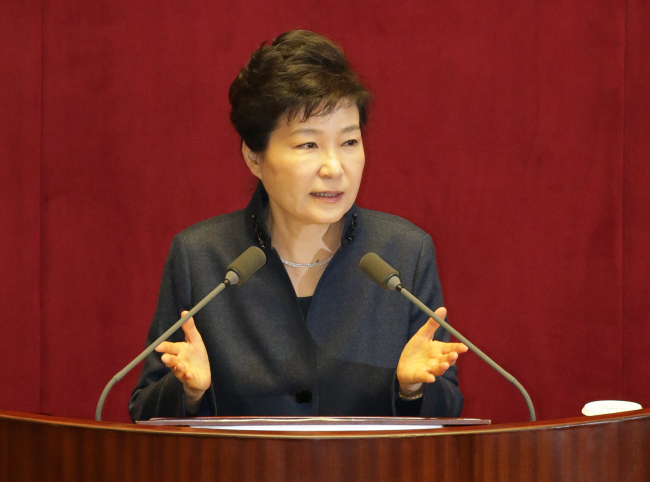President Park Geun-hye on Tuesday urged national unity and strong sanctions against North Korea’s provocations, saying Pyongyang will eventually deploy nuclear-loaded missiles unless Seoul and the international community take effective containment measures.
“We should no longer be deceived or threatened by North Korea, nor offer unconditional support in submission to its provocations,” the president said in her special speech delivered at the National Assembly.
“Now is the time to seek fundamental solutions to change the North and to implement the plans with courage.”
The president volunteered to deliver the speech to the nation in an attempt to soothe the public uproar triggered by the North’s recent military provocations and the South’s decision to shut down the inter-Korean industrial park in Gaeseong.
 |
| President Park Geun-hye speaks at the National Assembly on Tuesday. (Yonhap) |
“The North’s nuclear test and ballistic missile launch, as well as its unyielding stance, clearly shows that it does not share the international community’s pursuit of peace,” Park said.
“Should the present situation last, there will be no stopping the Kim Jong-un regime from deploying nuclear-loaded missiles.”
Park also pledged to cut off all financial support for the reclusive regime, claiming that the money was being appropriated for military uses, not for the sake of the citizens.
“From now on, the government will implement a series of powerful and effective measures to make the North Korean regime realize that nuclear development will not assure survival, but only bring forward the system’s destruction,” Park said. This is the first time that Park has publicly mentioned the possibility of North Korea’s collapse.
A total of 616 billion won ($505.5 million) in cash has been paid so far to the North for the operation of the Gaeseong complex, most of which was then delivered to the communist leadership and its weaponry development, according to Park.
The Seoul government’s flip-flopping claim that it has grounds to believe that most of the money sent through the industrial complex was appropriated for nuclear development stoked nationwide scrutiny for potentially breaking relevant U.N. resolutions and lacking details or background.
The president did not directly address such concerns, but said, “The decision to halt operations at the Gaeseong complex was based on the perception that the cut off of foreign currency was a key means of restraining the North from further nuclear development.”
“Since the fourth nuclear test (in early January), over 100 countries have censured North Korea for its provocations and the United Nations is currently drafting an unprecedentedly strong sanctions resolution,” the president said.
“It is only proper that we, as the prime victim of the North’s military threats, should take an active role in these antinuclear actions.”
The closure of the factory cluster — the first penalty measure — will be followed by other consecutive disciplinary actions, she also said.
While pledging for reinforced sanctions against the communist neighbor state, the president urged the opposition camp to stop political feuds and focus on overcoming the current crisis.
“When it comes to national security, there can be no lines between the ruling and opposition, or conservative and progressive,” Park said.
The Minjoo Party of Korea has been suggesting that the government and the ruling Saenuri Party were exploiting the North Korean factor to kindle the public’s sense of crisis and attract votes ahead of the April parliamentary elections.
Park also took the opportunity to put pressure on the parliament to pass a series of pending bills, including a counterterrorism bill, the North Korean human rights bill, the service industry promotion bill and a number of labor reform bills.
By Bae Hyun-jung (tellme@heraldcorp.com)

